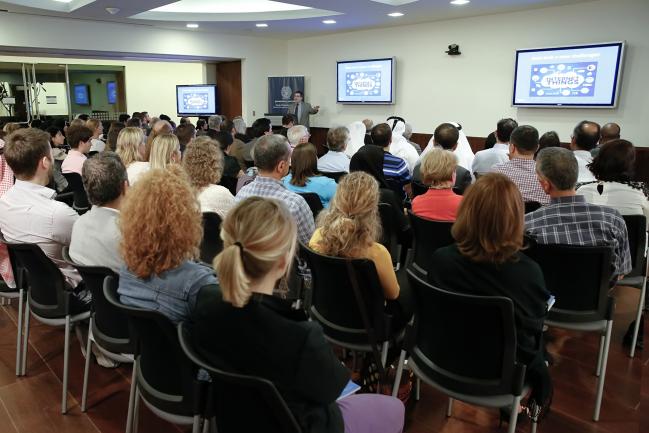Dialogue Series, Regional Studies
Attitudes to Cybersafety and Online Privacy in the Middle East

Damian Radcliffe, leader of the Rassed research program at Qatar’s Ministry of Information and Communications Technology (ictQATAR), delivered the inaugural CIRS Monthly Dialogue of the 2014-2015 academic year with a lecture on “Attitudes to Cybersafety and Online Privacy in the Middle East” on September 16, 2014. Emphasizing the importance of the topic, he noted that, despite their varying characteristics, most countries around the world share similar concerns regarding issues of cyber safety, online privacy, and data security. This has become a global conversation, and one that is no less relevant to the countries of the Middle East and North Africa. “There are very consistent values and attitudes that can often be found amongst internet users even though they might be from incredibly different countries and cultures,” he explained.
In order to test whether this hypothesis was indeed applicable to the countries of the Middle East, Radcliffe conducted research into Arab attitudes towards cyber safety, online privacy, and data security. Collaborating with researchers from a previous World Economic Forum study conducted in 2011, Radcliffe and his team surveyed just under 3,000 internet users from 14 countries across the Middle East. When combined with the previous study, the global sample surveyed was over 11,000 internet users covering nearly 60 countries. “One of the reasons we were really keen to take this project was the fact that it also gave us the opportunity to benchmark the experience of internet users in the Middle East with other people around the world,” Radcliffe explained. The research questions covered five specific areas of study including, usage of ICT and other technologies available in the household; attitudes towards the internet; concerns of internet users; trust in different online actors and online players; and behaviors of internet users.
Attitudes to Cybersafety and Online Privacy in the Middle East from ictQATAR
This comparative dataset gave the research a broad range of results as well as ones that could be broken down geographically and categorized as emanating from the GCC region, North Africa, or a combined MENA figure which also included some additional respondents from the Levant. The resulting data gave the researchers the opportunity to make specific differentiations between the various regions of the Arab World. For example, one of research findings highlighted the fact that differences between internet behaviors in the GCC and North Africa can be attributed to socio-economic factors. “People in the GCC are much more likely to access the internet on the move given smartphone penetration in the region…over 70% in Saudi and Qatar, whereas it is something like 2% in Egypt,” Radcliffe reported.
While there were some important key differences between internet users worldwide, the overall research findings proved Radcliffe’s initial hypothesis which stated that Middle East internet users are not so dissimilar from others around the globe. “Equivalency in terms of technological access as a regional figure compared to the rest of the world was pretty good. In fact, if you look at the GCC, there is much higher access to advanced forms of technology than there are in many other parts of the world,” he noted. The research team found that internet users in the Middle East, especially younger users, were very active online and were positive about the impact of the internet on their lives.
In comparison to the global average in terms of attitudes towards the internet, one main distinction of Middle East internet users was their tendency to place very little trust in those organizations that only existed online, which explains why “e-commerce here is much less prevalent than it is in other markets. In fact, within the region, people are much less likely to engage in e-commerce than they are in any of the other regions that we surveyed. They are also among the least likely to bank online. Traditional methods of shopping and banking still remain popular,” Radcliffe explained. Another key difference was Middle East internet users’ tendency to be more trusting of traditional forms of authority, whether in terms of government or financial institutions. The research results indicated that regional internet users were generally in favor of having governing authorities regulate internet content and were not too concerned about the safety of their personal information online. This is in stark contrast to those surveyed in Western countries who tended to be more wary of government and financial institutions, which is most likely a symptom of the recent economic crisis in those countries.
Radcliffe ended the lecture by highlighting some thoughts for the future of digital technologies, arguing that, with increased availability of personal surveillance technologies, issues of trust will most likely intensify in future. The more digital devices in the world, the greater the risk of security breaches, but simultaneously the greater the possibility of doing this differently and more constructively. “New technologies will bring new challenges, but also new opportunities,” he concluded.
Damian Radcliffe is an award-winning content creator, journalist, and researcher who has led diverse teams at the intersection of journalism, media innovation, and civic engagement for nearly 20 years. He currently leads the Rassed research program at Qatar’s Ministry of Information and Communications Technology (ictQATAR)—an initiative which explores the impact of ICT on society and the potential afforded by emerging technologies. His team has published over 80 studies, presentations, articles and infographics since mid-2012—in both English and Arabic—and their work as featured across a broad range of regional and international media. Their research was in the Top 1% of globally viewed content on LinkedIn’s SlideShare platform in 2013.
Article by Suzi Mirgani, Manager and Editor for CIRS Publications
Infographic: The attitudes of Internet users in the Middle East towards Cybersafety, Security and Data Privacy from ictQATAR مواقف مستخدمي الإنترنت في منطقة الشرق الأوسط حيال السلامة ولأمن على شبكة الإنترنت from ictQATAR